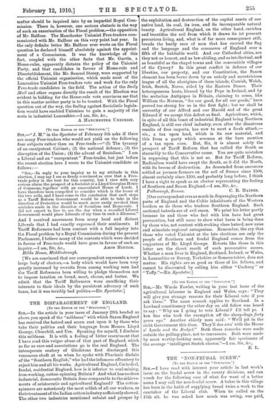THE DISPARAGEMENT OF ENGLAND.
LT0 THE EDITOR OF THE "SPECTATOR."] SIR,—In the article in your issue of January 29th headed as above you speak of the "mildness" with which Saxon England has received the hatred and scorn cast upon it by those who take their politics and their language from Messrs. Lloyd George, Churchill, and Ure. Speaking for• myself, I disclaim this mildness. It is with a feeling of bitter resentment that I have read this vulgar abuse of that part of England, which as far as race and associations go is the real England. The intemperate oratory of Gladstone first discharged this venomous shaft at us when he spoke with Pharisaic disdain of the " Southern English," who had the infamous effrontery to reject him and all his works. Agricultural England, Cathedral, feudal, residential England, how is it inferior to coal-mining, iron-working, cotton-spinning Britain P And what has modern industrial, democratic Britain done comparable to the achieve- ments of aristocratic and agricultural England ? The cotton- spinners are notoriously the most selfish of all our workers, as their treatment of the Indian cotton industry sufficiently showed. The other two industries mentioned subsist and prosper by the exploitation and destruction of the capital assets of our native land, its coal, its iron, and its incomparable natural beauty. Agricultural England, on the other hand, enriches and beautifies the soil from which it draws its (at present) precarious living, and, what is of far more consequence still, breeds the hardy race of men that has carried the flag and the language and the commerce of England over a fifth of the habitable world. And our Cathedral cities, are they not as honest, and as law-abiding, and as intellectual, and as beautiful as the chapel towns and the conventicle villages of the Cymry ? In this great conflict in defence of our liberties, our property, and our Constitution, the Saxon element has been borne down by an unholy and meretricious league of all the aborigines of these islands, Cornish, Welsh, Irish, Scotch, Norse, aided by the Eastern Danes. Their heterogeneous hosts, blessed by the Pope in Ireland, and by the sectarian Antipopes in Britain, claiming to come, like William the Norman, "for our good, for all our goods," have proved too strong for us in the first fight ; but we shall be unworthy of our Alfred and our Harold and of the great Edward if we accept this defeat as final. Agriculture, which, in spite of all this boast of industrial England being Northern England, is still our chief industry, even after the disastrous results of free imports, has now to meet a fresh attack,— viz., a tax upon land, which is its raw material, and this from a party which screams at the bare mention of a tax upon corn. But, Sir, it is almost solely the prospect of Tariff Reform that has rallied the South so staunchly to the Conservative cause. You are quite mistaken in supposing that this is not so. But for Tariff Reform, Radicalism would have swept the South, as it did the North, with its besom of destruction. As descended from ancestors settled as yeomen farmers on the soil of Sussex since 1500, almost certainly since 1200, and probably long before, I think I have a right to speak as an elector representing the feeling of Southern and Saxon England.—I am, Sir, &c., [Our correspondent errs as much in disparaging the Northern parts of England and the Celtic inhabitants of the Western borders as do those who traduce Southern England. Such sectional hatreds are of evil omen. We print his letter partly because he and those who feel with him have had great provocation, but still more to show what harm is being done by those who, not content with evoking class hatred, now raise and stimulate regional antagonism. Remember, the cry that those who voted Unionist at the late elections are only the people of Southern and feudal England comes from the supporters of Mr. Lloyd George. Retorts like those in this letter are the direct result of such provocative sneers. Whether a man lives in England, Scotland, Ireland, or Wales, in Lancashire or Surrey, Yorkshire or Somersetshire, does not matter. His rights ar•e as good as those of his fellows, and cannot he discounted by calling him either " Cockney " or "Taffy."—En. Spectator.]










































 Previous page
Previous page